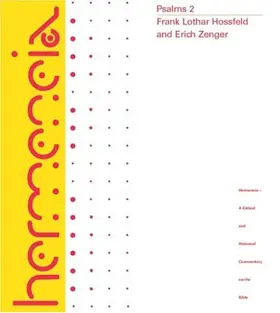

Psalms 2: 51–150
in Hermeneia
Pages
553
Publisher
Fortress Press
Published
2005
ISBN-13
9780800660611
Collections
This book appears in the following featured collections.
- Ultimate Commentary Collection: OT Technical by John Glynn
- Favorite Advanced OT Commentaries by Jeremy Pierce (parableman)
- Commentaries by Roman Catholic Scholars by John Dyer
Reviews
This work by Hossfeld and Zenger is THE most comprehensive and thorough commentary yet published on the Psalms. Replete with illustrations and diagrams while still operating with the remarkably user-friendly format of Hermeneia, it is a delight to use. Even for those not interested in redactional issues, this work is a must-have.
The first volume released of the Hermeneia on Psalms has just recently come out. It's by Frank Hossfeld and Erich Zenger. It's actually the second volume of the commentary, covering Psalms 51-100. It promises to be the scholarly standard for some time to come. Two things stand out from what I've looked at so far. One is a redactional history of the psalter, with a comprehensive picture of exactly which psalms come from exactly which period and how each layer involved alterations to the previous layer of development. I detected very little support for this massive structure, which serves as most of the introduction to this second volume. It amazes me that such speculative postulations can count as scholarship. The same issue arises in smaller scope with respect to the development of each psalm, usually with some commitment to a certain view of which parts of a psalm must be from which period in Israel's history. I looked in vain for convincing arguments for these claims. It seemed more as if it was a coherent structure from which to interpret the psalms that had come to support itself in the minds of the authors. The second feature that struck me as unusual is that Hossfeld and Zenger have an eye toward the New Testament, which they will reserve for discussion after their entire discussion of the psalm itself is complete. Their assumption that NT authors never cared a whit about the original context and just lifted things to fit some new idea regardless of the original context strikes me as at odds with all the evidence about how NT authors used OT texts, but even giving attention to the NT use of the psalms is remarkable in a mainstream scholarly series that explicitly disavows any attempt to serve homiletical purposes. These issues aside, I expect this three-volume work to be the standard scholarly commentary on the Psalms, in both careful exegesis and social background (a hallmark of this series).
Hossfeld and Zenger seem to incorporate more fruits from study of the Septuagint than most other scholars, but they remain remarkably conservative in terms of emending the Hebrew text and prefer to stick with the Masoretic Text when at all possible to explain the text as it stands. This combination of tendencies is extremely rare in Old Testament commentaries. Usually those motivated to spend more time in the Septuagint will be tempted to favor it far more than I would like. This increases my interest in this commentary considerably.
[Full Review]
A detailed scholarly commentary on Psalms 50-100 with much discussion about multiple stages of redaction in many psalms.
[Full Review]
Hilpoltstein, Germany D-91161 Scholars working on the Old Testament in general as well as those specializing on the Psalter in particular will inevitably come across the names Frank-Lothar Hossfeld, Professor of Old Testament at the University of Bonn, Germany, and Erich Zenger, Professor of Old Testament at the University of M�nster, Germany. Both have individually published a number of relevant monographs in the field and together accomplished two volumes of a commentary on the Psalms accompanied by the German Einheits�bersetzung (Die Psalmen: Psalm 1�50 [NEchtB 29; Wrzburg: Echter, 1993]; � Die Psalmen: Psalm 51�100 [NEchtB 40; Wrzburg: Echt er, 2002]) with volume 3 still to be published. However, the common project of the two is their meticulous work on a three-volume commentary in the Herders Theologischer Kommentar zum Alten Testament (HTKAT) series with volumes 1 and 3 still to come. Their commentary on Pss 51�100 (Psalmen 51�100 [HTKAT; Freiburg im Breisgau: Herder, 2000]) alone comprises 727 pages (compare the 212 pages of the appropriate volume in the NEchtB series). Although a massive volume, this middle part of the three-set commentary has not become a classic due to its physical weight. Hossfeld and Zenger provide fresh translations, text-critical and philological details, comments on contents and structure, and some notes on the text of the Septuagint and the survival of specific topics in the New Testament for each psalm. The editorial board of the Hermeneia series (see my notes on the series in my review of L. Edward Phillips, Paul F. Bradshaw, and Maxwell E. Johnson, The Apostolic Tradition, RBL 34 [2003: http://bookreviews.org/pdf/2989_3104.
[Full Review]



